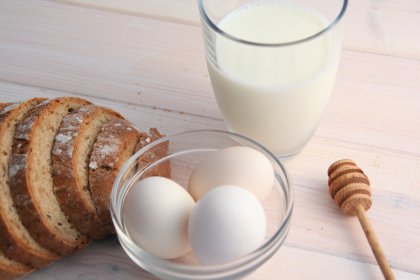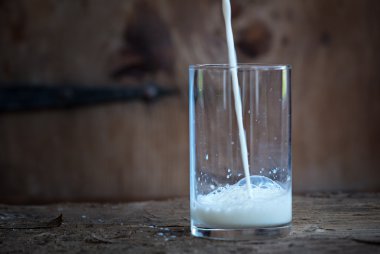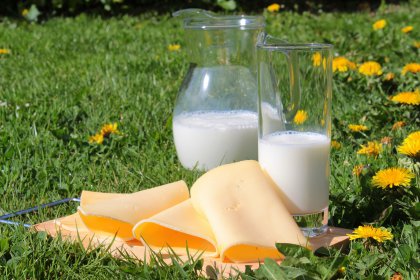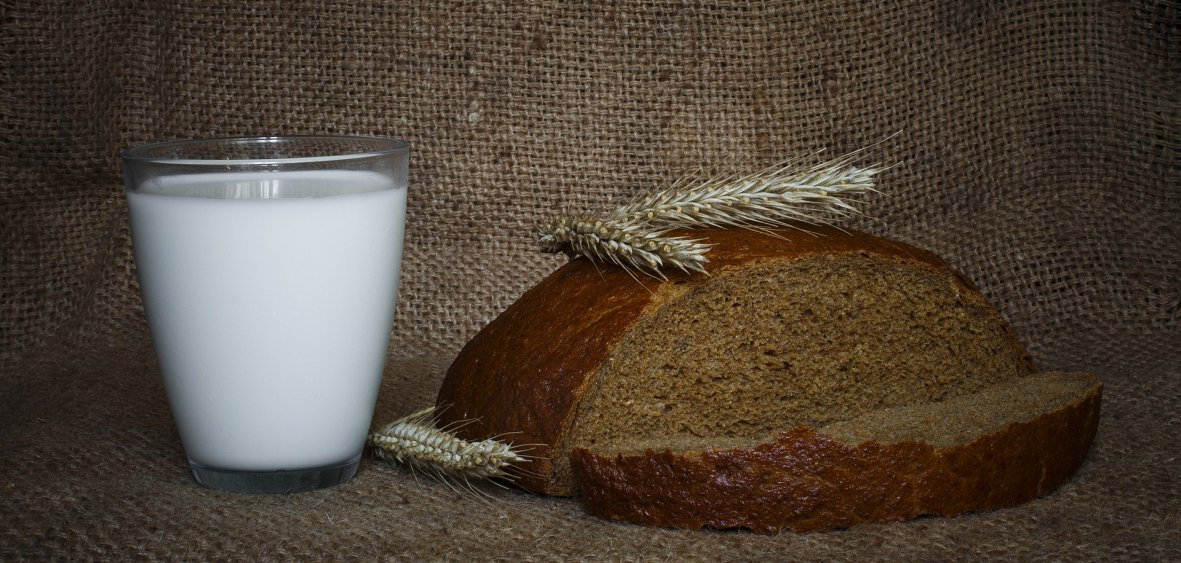 Dairy products are products that contain milk and milk products. This group includes cheeses, cottage cheese, yoghurts, buttermilk and kefirs. Dairy products are a very valuable source of calcium, protein, fats, mineral salts and vitamins: A, B2, B12, D.
Dairy products are products that contain milk and milk products. This group includes cheeses, cottage cheese, yoghurts, buttermilk and kefirs. Dairy products are a very valuable source of calcium, protein, fats, mineral salts and vitamins: A, B2, B12, D.
Milk as a source of protein and calcium
 Dairy products contain large amounts of wholesome protein. Our organisms use them for proper growth and development. Moreover, enzymes contained in the protein take part in the synthesis of hormones and enzymes, accelerate the process of wound healing and cell regeneration. For this reason, milk and milk products are particularly recommended for children, women and seniors.
Dairy products contain large amounts of wholesome protein. Our organisms use them for proper growth and development. Moreover, enzymes contained in the protein take part in the synthesis of hormones and enzymes, accelerate the process of wound healing and cell regeneration. For this reason, milk and milk products are particularly recommended for children, women and seniors.
Calcium affects the condition of our bones. It should be remembered that changes in the skeletal system occur throughout our lives, so the supply of this mineral is extremely important in both young and old age. Calcium contained in milk and its products is very well absorbed by the body. Its assimilability depends on the amount of phosphorus present, and in the case of dairy products, the ratio of these two minerals is almost ideal.
Allergies to dairy products
Unfortunately, dairy products can cause allergies. Some people do not tolerate protein, others are allergic to lactose, i.e. the sugar contained in milk. Dairy allergies are most common in small children (up to 6 years of age). In the case of allergies, it is important to look for alternative solutions, products that do not contain allergenic ingredients.
The most common symptoms of allergy to milk include diarrhoea, vomiting, skin rash (eczema or atopic dermatitis). The most serious effects of allergy are bronchial asthma attack and anaphylactic shock. Both states can even lead to death. If you notice any of these symptoms at home or in your child, allergy tests should be carried out and, if the diagnosis is confirmed, dairy products should be eliminated from the diet.
Milk

Milk is a basic product in the group of dairy products, it contains calcium, vitamins D, A, B vitamins and minerals. It is also a provider of valuable protein. Milk should be consumed by people suffering from metabolic diseases or too high cholesterol. Milk is a valuable product that prevents osteoporosis.
Cream
The first product that can be obtained from milk is cream. When the cream gives way to acidification, a cream is created. The cream, which is to remain 'sweet', is pasteurised at 95 degrees Celsius. This process prolongs its shelf life.
Cream and cream contain from 10 to 36% fat. They are a tasty addition to soups, sauces, salads, and also to creams, sweet masses, or coffee whitener.
Cheeses
 Cheeses are extremely diverse products. Milk is used to make curd, melted cheese, yellow and mouldy cheeses. Cheeses are made from precipitated fat and white. The varied way and time of further processing leads to the formation of a huge number of cheese species and varieties.
Cheeses are extremely diverse products. Milk is used to make curd, melted cheese, yellow and mouldy cheeses. Cheeses are made from precipitated fat and white. The varied way and time of further processing leads to the formation of a huge number of cheese species and varieties.
Cottage cheese is white in colour, slightly acidic, contains no preservatives and is easily digestible.
Yellow cheeses are quite oily and contain cholesterol in addition to fat, so the amount of yellow cheese consumed should not exceed two slices a day. The advantage of these products is their high calcium content.
Melted cheeses are not as rich in calcium as yellow cheeses, but they contain a lot of phosphate. It should be remembered that calcium uptake depends on the calcium to phosphorus ratio, so the latter is as important for the skeletal system as calcium. Melted cheeses are as oily and highly calorific as yellow cheeses.
Dairy drinks

Kefirs and yoghurts are a great alternative for people who do not tolerate lactose. Bacteria contained in dairy drinks do not allow the development of harmful microorganisms, moreover, they immunize the body, have an anti-inflammatory effect, strengthen the mucous membrane, protect the intestines. The consumption of yoghurts and kefirs enriches the body with calcium, phosphorus, potassium, B vitamins and protein. Kefir regulates metabolism. It is also very useful in cases of food poisoning and prevents the development of pathogenic bacteria.
Sour milk is a very tasty and valuable milk drink. It is created by a natural fermentation process taking place in milk. Sour milk has a great influence on building a friendly bacterial flora in the gastrointestinal tract. Like other dairy drinks, it contains calcium and B vitamins.
Buttermilk is an easily digestible product. It is created by homogenizing the liquid separated from the cream. Buttermilk is less fatty than milk. It strengthens the body, regulates intestinal peristalsis, stimulates the secretion of digestive juices.
Goat's milk - product for allergy sufferers
 If you are allergic to cow's milk protein, you can reach for goat's milk. The milk is yellowish in colour and has a slightly salty taste. It is rich in mineral salts, calcium, phosphorus, potassium, chlorine, fat and protein and vitamin A. Unfortunately, goat's milk does not contain as much folic acid and vitamin B12 as its cow's equivalent.
If you are allergic to cow's milk protein, you can reach for goat's milk. The milk is yellowish in colour and has a slightly salty taste. It is rich in mineral salts, calcium, phosphorus, potassium, chlorine, fat and protein and vitamin A. Unfortunately, goat's milk does not contain as much folic acid and vitamin B12 as its cow's equivalent.
The consumption of goat's milk protects against infections and other diseases. Its main advantage, however, is that it can be taken by allergy sufferers. Goat's milk should not be fed to infants.
Sheep's milk
Sheep's milk is richer in protein and fat than cow's milk. However, this is not the best product in taste. They are most often used to make mountain cheeses, such as oscypek or bryndza.















